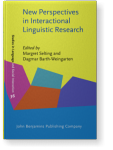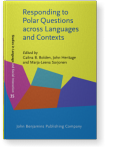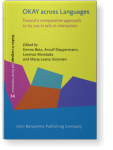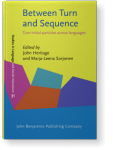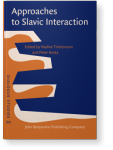Matylda Weidner
List of John Benjamins publications for which Matylda Weidner plays a role.
2024 Introducing the “Parallel European Corpus of Informal Interaction” (PECII): A novel resource for exploring cross-situational and cross-linguistic variability in social interaction New Perspectives in Interactional Linguistic Research, Selting, Margret and Dagmar Barth-Weingarten (eds.), pp. 132–160 | Chapter
This article introduces the Parallel European Corpus of Informal Interaction (PECII), a multi-language video-corpus of social interactions in a range of informal settings and activity-contexts. After describing the basic motivation for its compilation, the design principles that underlie its… read more
2023 Chapter 4. Responses to polar questions in Polish Responding to Polar Questions across Languages and Contexts, Bolden, Galina B., John Heritage and Marja-Leena Sorjonen (eds.), pp. 109–138 | Chapter
Using data from naturally occuring Polish conversations this chapter demonstrates how speakers of Polish answer polar questions. It offers a detailed conversation analytic examination of two response formats, particularly in their unexpanded form: (i) particle responses, which are used for… read more
2021 Chapter 11. OKAY projecting embodied compliance to directives OKAY across Languages: Toward a comparative approach to its use in talk-in-interaction, Betz, Emma, Arnulf Deppermann, Lorenza Mondada and Marja-Leena Sorjonen (eds.), pp. 337–362 | Chapter
This chapter on Estonian and Polish OKAY focuses on complying responses to high entitlement directives. The responses are built of two parts, the verbal OKAY that completes the adjacency pair and an embodied compliance that ensues. The OKAY provides an immediate verbal notification and acceptance… read more
2018 Chapter 8. Treating something as self-evident: No-prefaced turns in Polish Between Turn and Sequence: Turn-initial particles across languages, Heritage, John and Marja-Leena Sorjonen (eds.), pp. 225–250 | Chapter
This chapter offers a detailed sequential examination of the usage of the turn-initial Polish particle no in responsive actions. It demonstrates that no represents a particular kind of epistemic stance, where it contributes a “my side” positioning of the no speaker, and in this way participates in… read more
2013 ‘This is how I see it’: No prefacing in Polish Approaches to Slavic Interaction, Thielemann, Nadine and Peter Kosta (eds.), pp. 147–166 | Article
A number of conversation analytic studies have suggested that asymmetries of knowledge and access to knowledge and experience contribute to the organization of the interaction. Building on previous research on the epistemics of social relationships, this paper draws on audiotaped doctor-patient… read more
